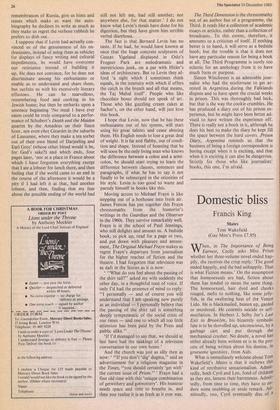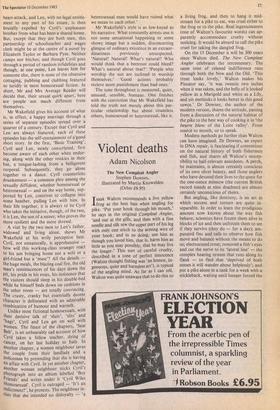Domestic bliss
Francis King
Mates Tom Wakefield (Gay Men's Press 0.95)
When, in The Importance of Being Earnest, Cecily asks Miss Prism whether her three-volume novel ended hap- pily, she receives the crisp reply: 'The good ended happily, and the bad unhappily. That is what Fiction means.' On the assumption that homosexuals are bad, fiction about them has tended to mean the same thing. The homosexual, hair dyed and cheeks rouged, melts to nothing, like some jelly- fish, in the sweltering heat of the Venice Lido. He is blackmailed, beaten up, gaoled or murdered. He commits suicide or self- mutilation. In Herbert J. Selby Jnr's Last Exit to Brooklyn, his bizarrely symbolic fate is to be shovelled up, unconscious, by a garbage cart and put through the mechanical crusher. No doubt, a novel has either already been written or is in the pro- cess of being written about his demise, in gruesome ignominy, from Aids.
What is immediately welcome about Torn Wakefield's Mates is that it eschews this kind of retributive sensationalism. Admit' tedly, both Cyril and Len, fond of childrea as they are, lament their barrenness. Adria' tedly, from time to time, they have to co- dure some snubbing or snide remark. Ad' mittedly, too, Cyril eventually dies of a
heart-attack, and Len, with no legal entitle- ment to any part of his estate, is then brutally expelled by Cyril's unpleasant brother from what has been a shared home. But, except that they are both men, this partnership of schoolteacher and wages clerk might be at the centre of a novel by Elizabeth Taylor or Barbara Pym. Neither camps nor bitches; and though Cyril goes through a period of random infidelities and though, at one point, Len leaves him for someone else, there is none of the obsessive cottaging, pubbing and clubbing featured so luridly in most homosexual fiction. In short, Mr and Mrs Average Reader will decide that, their sexual quirk apart, here are people not much different from themselves.
Mr Wakefield gives his account of what is, in effect, a happy marriage through a series of separate episodes spread over a quarter of a century. Except that Cyril and Len are always featured, each of these episodes has the self-containment of a'good short story. In the first, 'Basic Training', Cyril and Len, newly conscripted, first become aware of each other when endur- ing, along with the other rookies in their hut, a tongue-lashing from a belligerent corporal. Subsequently, they go alone together to a dance. Cyril counterfeits drunkenness — a common ploy among the sexually diffident, whether homosexual or heterosexual — and on the way home, sup- ported by Len, contrives to collapse into some heather, pulling Len with him. In their life together, it is always to be Cyril who takes the initiative, though, of the two, it is Len, the son of a miner, who proves the more resilient and the more shrewd.
A visit by the two men to Len's father, Widowed and living alone, shows Mr Wakefield at his wrily perceptive best. Cyril, not unnaturally, is apprehensive — how will this working-class stranger react to his son bringing home not a wife or a girl-friend but a 'mate'? All the details — the huge meals, the blazing coal fire, the old man's reminiscences of his days down the Pit, his pride in his roses, his insistence that the visitors should sleep in his double-bed While he himself beds down on cushions in the other room — are totally convincing. The crusty, cranky but essentially decent character is delineated with an admirable combination of humour and warmth.
Unlike most fictional homosexuals, with their derisive talk of 'sluts', 'slits' and hags', Cyril and Len get on well with women. The finest of the chapters, 'Seat Belt', is an unbearably sad account of how Cyril takes a fellow teacher, dying ol cancer, on her last holiday to Italy. In another chapter, a women neighbour saves the couple from their landlady and a Policeman by pretending that she is having an affair with Cyril. In yet another chapter, another woman neighbour sticks Cyril's Photograph into an album labelled 'Boy Friends and writes under it 'Cyril Wiles iomosexual'. Cyril is outraged — 'It's an indictment!', he protests. The neighbour in- sists that she intended no disloyalty — 'a
heterosexual man would have ruined what we mean to each other.'
Mr Wakefield's style is as low-keyed as his narrative. What constantly arrests one is not some sensational happening or some showy image but a sudden, disconcerting glimpse of ordinary existence in an extraor- dinariness previously unsuspected. 'Natural! Natural! What's natural? Who would think that a beetroot could bleed? What's natural about that?' People who worship the sun are inclined to worship themselves.' Good actions probably recieve more punishment than bad ones.'
The tone throughout is measured, quiet, amused, sensible, humane. One finishes with the conviction that Mr Wakefield has told the truth not merely about this par- ticular relationship but about countless others, homosexual or heterosexual, like it.















































 Previous page
Previous page